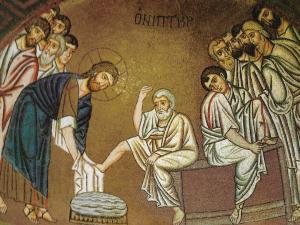
Because most institutional churches prioritize attractional events and programs over authentic relational discipleship, many churches only become concerned about the spiritual lives of members if there is a change in attendance.
Discipleship Cannot Be Programmed
Many institutional churches assume that connecting people to events and ministries is exactly what every person must need. Sure, sporadic life transformation happens occasionally, but the organization is so dependent upon perpetuating itself through programs, scheduled services, and tithes/offerings, it assumes the “Jesus part” will take care of itself by people merely participating some way, somehow.

So, real discipleship often doesn’t take place.
Attending scheduled services, singing songs, and hearing a sermon doesn’t make Christlike disciples. Neither does participating in some kind of programmed event, either as an organizer or attendee.
The problem is when a synthetic infrastructure organizes people into an institution of members or attendees instead of transformational relationships uniting the lost into a family of Christlike disciples.
A Far Cry
Each of the synoptic gospels depict Jesus sending his disciples out in pairs, commissioned to tangibly change the lives of others, and empowered to share the same kingdom message he preached.
According to the gospel of John, on the night Jesus was betrayed, he gave them a final instruction:
“A new command I give you: Love one another. As I have loved you, so you must love one another. By this everyone will know that you are my disciples, if you love one another.” (John 13:34-35, NIV)

There is no substitute for relational love. It cannot be programmed or synthesized.
The issue isn’t the people who make up the institution whatsoever. While it remains true that there is a predisposition for relationships inside traditional churches mega, large, and small to be superficial, by no means am I implying Christians don’t care about their fellow churchgoers. And make no mistake: the Church is the people, the living hands and feet of the body of Christ.
Nor do I mean that people shouldn’t attend church. But to make disciples, we must ourselves be the church.
An institutional organization cannot care or love, only respond and act. Though that may sound sufficient, it’s not only a limitation, but a subversion of how Jesus instructed his disciples to make disciples.
Jason’s Story
A couple of decades ago, a young man I will call “Jason” forever altered the course of my life.
Just the previous month, God had used a meeting between myself and another friend to accidentally plant a unique kind of church inside a coffee shop. Our intentions had only been to have coffee, pray with one other, and read the Bible together in community. However, as we shared our lives with each other, those around us were transformed by Jesus through the relationships we were building.

When Jason came in with a friend one night, we hit it off right away. He and I stayed long past closing time, and even continued talking in the parking lot.
Jason had attended church a few times with a friend, but he didn’t like or understand it all that much. He had reading disabilities, and was struggling to comprehend the KJV scriptures people were telling him he had to read. He also confessed he felt guilty because he didn’t have a car or any transportation to go to church, but lots of people at that church spoke to him about what he had missed when he had not attended.
He was also struggling with severe drug addiction.
I offered to give Jason rides when I could, found a dynamic Bible translation with simple contemporary language that was easy for him to understand, and gave him his own copy. Another friend gave him the same translation narrated on a CD, which he listened to every night, tracing the words on the onionskin with his finger.
He and I began spending time together several times a week, and after he acquired a car, we fell into a habit of regularly meeting at the same restaurant. For almost two years, we shared our lives with one another, spoke about addiction, celebrated successes, read the Word together, and lifted up one another in prayer. Even our regular server at the restaurant we frequented came to saving faith in Jesus through our meetings.
One of Jason’s other friends began pressuring him to go to a traditional church. Although Jason told me he didn’t feel comfortable going, I encouraged him to try.
The first week he went, a member of the worship team offered him drugs in the parking lot.
Our meetings became increasingly sporadic, and slowly our friendship seemed less open. He acted as if he felt uncomfortable, though I had never judged him.
He continued attending the traditional church, even though he confessed that he felt like an outsider and struggled to fit in. He said everyone left him alone as long as he didn’t miss a service, except for the people who regularly offered to sell him drugs.
Around the same time, I married, and accepted an opportunity to serve as the lead pastor of a small church a couple of towns away. Jason found a job in the oil field, and began using drugs daily.
We crossed paths one last time at breakfast with a mutual friend. Jason was under the influence, and making meaningful conversation was impossible.

I heard wild stories from others about Jason being hospitalized or arrested, along with tales of narrow escape from all kinds of dangerous situations. Whenever I called him, I always left a voicemail, but my calls were never returned.
One day, a close friend reached out to me in tears. Jason had taken his own life.
It would be easy and true to conclude that Jason succumbed to decades of drug addiction. But the whole story is that no one in the traditional church he attended did anything but talk to him about his attendance, complain about the version of the Bible he brought with him, and sell him drugs.
Sown Among Thorns
One of a number of pastors of traditional churches I follow on social media posted the following to their profile:
“In order for the pastor to fulfill
the Lord’s command to feed God’s flock,
the sheep must show up during feeding times.”
Certainly that pastor feels Christ’s call to Peter depicted in the gospel of John applies to him and other pastors as well. However, that passage is actually a command to a disciple to go and carry the gospel to the lost—not an expectation that churchgoers have perfect attendance so they can hear a sermon every week.
Now, Jesus referred to himself as the good shepherd, the one who lays down his life for his sheep. In a parable, Jesus also spoke of how a shepherd would leave ninety-nine sheep in open country to go and find the one that is lost, but that also seems at odds with the apparent belief that the lost must come to a scheduled service to hear a sermon and find salvation, or that Christians may only find fulfillment by attending church.
But there is a parable that possibly addresses such a narrative.
In all three synoptic gospels, Jesus tells the Parable of the Sower. The story is about one who went out to sow seeds. As the sower scattered the seeds, they fell upon different types of soil. Some seed fell along the path and was scavenged by birds before it could grow. Others fell along rocky ground and sprang up quickly, but also withered and died quickly because their roots were shallow and never took hold. Still others fell on good soil and flourished, their yield multiplied exponentially from the seeds that were planted.
And some seed fell among thorns: the thorns choked out the life from the plant, so it never bore fruit, and died.

Jesus explained that the seed is the word—in other words, we disciples who share the gospel are the seed, and your life may be the only gospel some may ever see or hear. When we share our lives, this is discipleship, and those we find relationships with are soil, both good and bad.
Some churches, by emphasizing attendance and offerings over real discipleship, become pits of thorns. Programmed institutions without discipleship can choke out the life genuine relationships can offer, or at least leave room for parasites like addiction, prejudice, greed, and guilt. Just because the word “church” is on the sign doesn’t mean actual life transformation takes place on a relational level.
Anyone can hear songs and get emotional. Anyone can preach, and anyone can find some kind of inspiration from a sermon, or feel nothing at all. We can mix Kool-Aid together, volunteer to teach, read the same Bible study, provide childcare, give rides, cook food, count money, mow the grass, create PowerPoints, clean the toilets, or anything else a program or institution requires, but none of those activities makes Christlike disciples.
The only way to make disciples is to share your life with someone, and if Jesus is in your heart, you are sharing him as well.
Without that, we’re just playing church rather than being the Church.


















